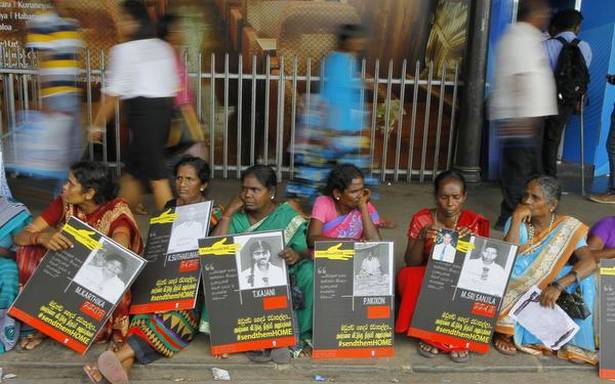This is President Rajapaksa’s first outreach yet to the families of the missing
Sri Lanka’s President Gotabaya Rajapaksa will soon meet families of missing persons who have been protesting to find their relatives’ whereabouts, according to a top official.
“The President is really determined to bring closure to this issue and give the families a solution,” Secretary to the Ministry of Foreign Affairs (Retd.) Admiral Jayanath Colombage told The Hindu on Thursday.
Scores of Tamil families in the north and east, mostly women, have been relentlessly agitating by the roadside – they recently marked four years of continuous protest – demanding the truth about their loved ones.
This is President Rajapaksa’s first outreach yet to the families of the missing, with a promise of closure. “He [President] wants to listen to them, identify their actual grievances, rather than what politicians might say, and given them a solution. It will happen very soon,” Mr. Colombage said.
Mr. Rajapaksa’s initiative coincides with the ongoing session of the UN Human Rights Council, where members will soon vote on a new resolution on Sri Lanka’s rights record. In a scathing report, the UN Human Rights chief has warned of Sri Lanka’s “deteriorating” rights situation, and sought targeted sanctions against perpetrators, and an International Criminal Court probe into alleged war crimes. Sri Lanka has rejected her report, terming its recommendations “ill-founded”.
Enforced disappearances – during the war and later – have remained among Tamils’ key concerns in the post-war decade, with no government offering a solution that families have found convincing.
Addressing the media during his presidential campaign in 2019, Mr. Rajapaksa, war-time Secretary to the Ministry of Defence, said a total of 13,784 people who had surrendered had been rehabilitated, reintegrated, and given employment. But families, who have testified before different governmental commissions and the Office on Missing Persons, maintain that their relatives are not among those released.
A month into office, President Rajapaksa told the UN Resident Coordinator that thousands who were reported missing were “actually dead”, heightening their families’ worst fears.
According to rights watchdog Amnesty International, Sri Lanka has one of the world’s highest number of enforced disappearances — at least 60,000 since the 1980s. In addition to war-time disappearances, and abductions reported in the following years, this includes Sinhalese youth, who went missing during the armed insurrection led by the leftist-nationalist Janatha Vimukthi Peramuna.
Source: Read Full Article

